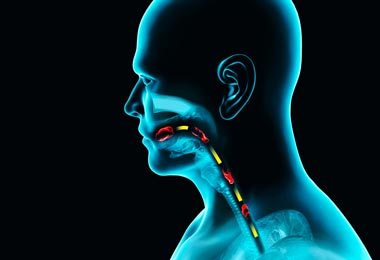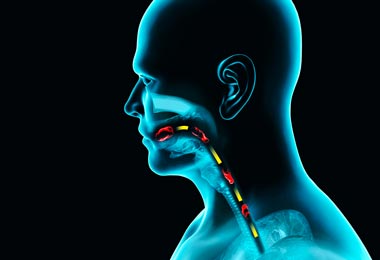Infectious Esophagitis
Esophagitis is swelling and irritation of your esophagus. The esophagus is the tube you use to swallow. It connects the back of your throat to your stomach. The most common cause of swelling and irritation of the esophagus is stomach acid that flows back into your esophagus.
But infections can also cause this swelling and irritation. Fungi, yeast, viruses, and bacteria can all set off the condition, called infectious esophagitis. Anyone can get it, but you are more likely to develop it if your immune system is weakened.
Causes
Infectious esophagitis can be caused by fungi, yeast, viruses, and bacteria.
Symptoms
These are symptoms of infectious esophagitis:
Pain when swallowing
Difficulty swallowing
Mouth pain
Chest pain
Nausea or vomiting
Chills or fever
Risk factors
People with a normal immune system are unlikely to get infectious esophagitis. If you have a medical condition or are undergoing treatment that weakens your immune system, you could be at risk. These conditions put you at risk:
Cancer treatments, including chemotherapy and radiation treatments
Bone marrow or stem-cell transplant treatment
Medicines that depress the immune system, such as steroids or medicines taken after an organ transplant
Long-term antibiotic use
Medicines that limit how much stomach acid you produce
Alcohol abuse
Advanced age can also make you more likely to get it.
Diagnosis
Your healthcare provider may suspect infectious esophagitis if you have symptoms of esophagitis along with a condition that weakens the immune system.
To make a diagnosis, your healthcare provider may order certain tests:
Endoscopy. During this outpatient procedure, the gastroenterologist passes a thin, flexible scope through your mouth to examine your esophagus. He or she might take swabs and scrapings to find the cause of an infection if he or she sees signs, such as white patches, fluid-filled blisters, or sores in your esophagus.
Blood work. Your healthcare provider may test your blood for viruses that can cause infectious esophagitis, such as herpes simplex virus.
Treatment
If you have a healthy immune system, your infection may clear on its own without treatment. How infectious esophagitis is treated often depends on the cause:
Esophagitis caused by a fungus called Candida. This fungus may be treated with an antifungal medicine called fluconazole or other similar medicines.
Viral esophagitis may be treated with antiviral medicines, such as acyclovir.
Bacterial esophagitis may be treated with broad-spectrum antibiotics. These are medicines that work against many types of bacteria.
Sometimes acid blockers are used along with other treatments.
Complications
Complications are unusual unless you have a condition or disease that weakens your immune system. Complications may include:
Infection that spreads to other parts of your body
Scar tissue that forms in the esophagus and causes a narrowing
Ulcers in the esophagus that lead to bleeding
A hole in the esophagus called a perforation or fistula
When to call the healthcare provider
Call your healthcare provider if you have any questions about your medicines or any other aspect of your treatment. Let your healthcare provider know right away if you have:
Increased difficulty swallowing
Pain with swallowing
Symptoms of infection, such as chills or fever
Chest pain or difficulty breathing
Living with infectious esophagitis
While you are recovering from infectious esophagitis, work closely with your healthcare provider and keep all your follow-up appointments.
If you have ongoing symptoms of painful or difficult swallowing, your healthcare provider may suggest that you take these steps:
Stop smoking.
Avoid alcohol and caffeine.
Avoid over-the-counter medicines that may irritate your esophagus, such as aspirin or ibuprofen.
Avoid foods or beverages that give you heartburn.
Lose weight if you are overweight.
Eat smaller meals more often.
Avoid eating for 3 hours before you go to bed.
Avoid sleeping in a flat position. Elevate the head of your bed several inches.





